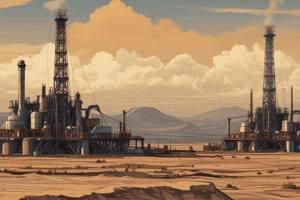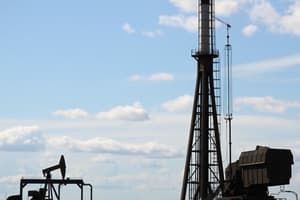Podcast
Questions and Answers
What are some examples of sustainable energy sources mentioned in the text?
What are some examples of sustainable energy sources mentioned in the text?
- Coal power and natural gas power
- Oil power and gas power
- Geothermal power and tidal power
- Solar power and wind power (correct)
Why are sustainable energy sources considered better for the environment?
Why are sustainable energy sources considered better for the environment?
- Because they pollute the environment.
- Because they are renewable resources. (correct)
- Because they are non-renewable resources.
- Because they rely on fossil fuels.
What differentiates renewable resources from fossil fuels?
What differentiates renewable resources from fossil fuels?
- Using renewable resources pollutes the environment.
- Fossil fuels are replenished within a human lifetime.
- Renewable resources are replenished within a human lifetime. (correct)
- Renewable resources are non-renewable sources of energy.
What is regulated by federal restrictions like the Clean Air Act and the Clean Water Act?
What is regulated by federal restrictions like the Clean Air Act and the Clean Water Act?
What is one of the alternatives to hydraulic fracturing mentioned in the text?
What is one of the alternatives to hydraulic fracturing mentioned in the text?
Why is using renewable resources as an alternative to fossil fuels beneficial?
Why is using renewable resources as an alternative to fossil fuels beneficial?
What makes sustainable energy sources preferable over fossil fuels?
What makes sustainable energy sources preferable over fossil fuels?
Which act regulates how accidents are cleaned up according to the text?
Which act regulates how accidents are cleaned up according to the text?
What effect does using sustainable energy have on the environment?
What effect does using sustainable energy have on the environment?
What defines renewable resources according to the text?
What defines renewable resources according to the text?
Flashcards are hidden until you start studying
Study Notes
Overview of Fossil Fuels
- Fossil fuels are essential in the modern world, generating energy, powering cars, and processing plastics.
- Fossil fuels are composed of coal, oil, natural gas, and derivative fuels produced from these raw materials.
- Fossil fuels are formed from ancient plants and animals that lived during the Carboniferous period, approximately 300 million years ago.
What is Hydraulic Fracturing?
- Hydraulic fracturing is a process that blasts and breaks impermeable rock with a mixture of water, sand, and chemicals to extract trapped fossil fuels.
- The purpose of hydrofracking is to extract oil and natural gas from locations with an abundance of fossil fuels but are hard to access.
History of Hydraulic Fracturing
- Modern hydrofracking in the United States originated from Colonel Edward A.L. Roberts, who observed how artillery shots affected the landscape.
- The process evolved over time, with advancements in the 20th and 21st centuries, including the use of pressurized water, sand, and chemicals, and horizontal drilling.
Mechanics of Hydraulic Fracturing
- Fossil fuels reside in sedimentary and metamorphic rock, such as shale, sandstone, and limestone.
- Fracking fluid is primarily composed of water, sand, and chemicals, with the latter being varied and dependent on the type of rock.
- The process involves drilling a hole, drilling horizontally, and forcing fracking fluid into the hole to shatter the surrounding rock.
What is Fracking Used For?
- Hydraulic fracturing is used to extract unconventional sources of gas and oil, including coalbeds and tight sands.
- Shale gas extraction has become a common method of natural gas extraction, as shale is an abundant source of gas despite its wide dispersal rate.
Hydraulic Fracturing Today
- Hydraulic fracturing is common in the United States, with 21 states having active fracking wells.
- The number of hydraulic fracturing wells rose from 23,000 to 300,000 between 2000 and 2015.
- Hydraulic fracturing accounts for 67% of U.S. natural gas production and 51% of crude oil production.
Environmental Concerns
- Environmental concerns include the use of a large amount of water and the mixture of fracking fluid with hundreds of undisclosed chemicals.
- Fracking fluid can contaminate groundwater sources and leach into local bodies of water.
- Drilling and wastewater disposal can cause earthquakes.
Economic Benefits
- Hydraulic fracturing creates jobs, with the industry maintaining 9.8 million jobs, accounting for 5.6% of total U.S. employment.
- An increase in oil revenue boosts the economy.
Laws Regulating Hydraulic Fracturing
- Regulation of fracking occurs at the state level, with each state having unique requirements.
- Federal restrictions, such as the Clean Air Act and Clean Water Act, also apply.
Alternatives to Hydraulic Fracturing
- Alternatives to fracking include sustainable energy sources, such as solar power, wind power, hydroelectrical power, and nuclear power.
- These sources are renewable and better for the environment, guaranteeing a power source that will not run out.
Studying That Suits You
Use AI to generate personalized quizzes and flashcards to suit your learning preferences.




